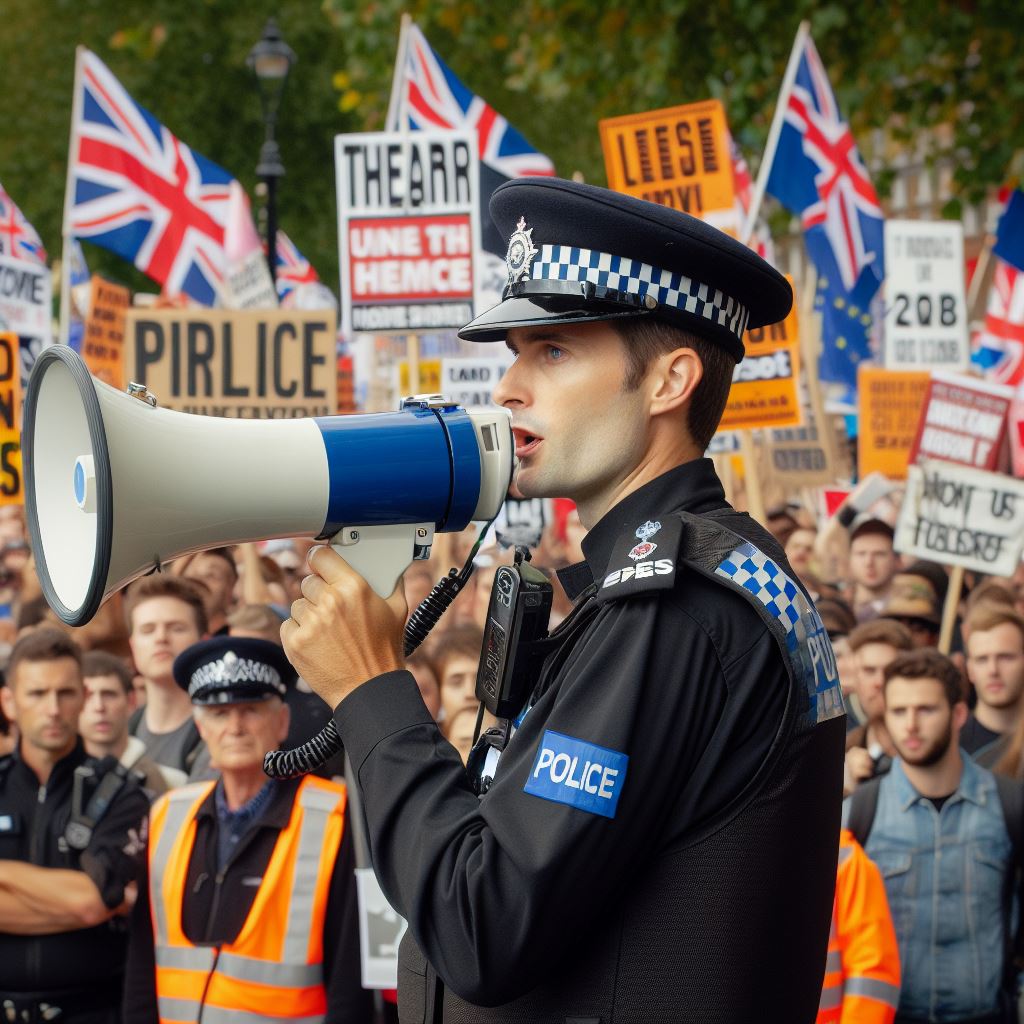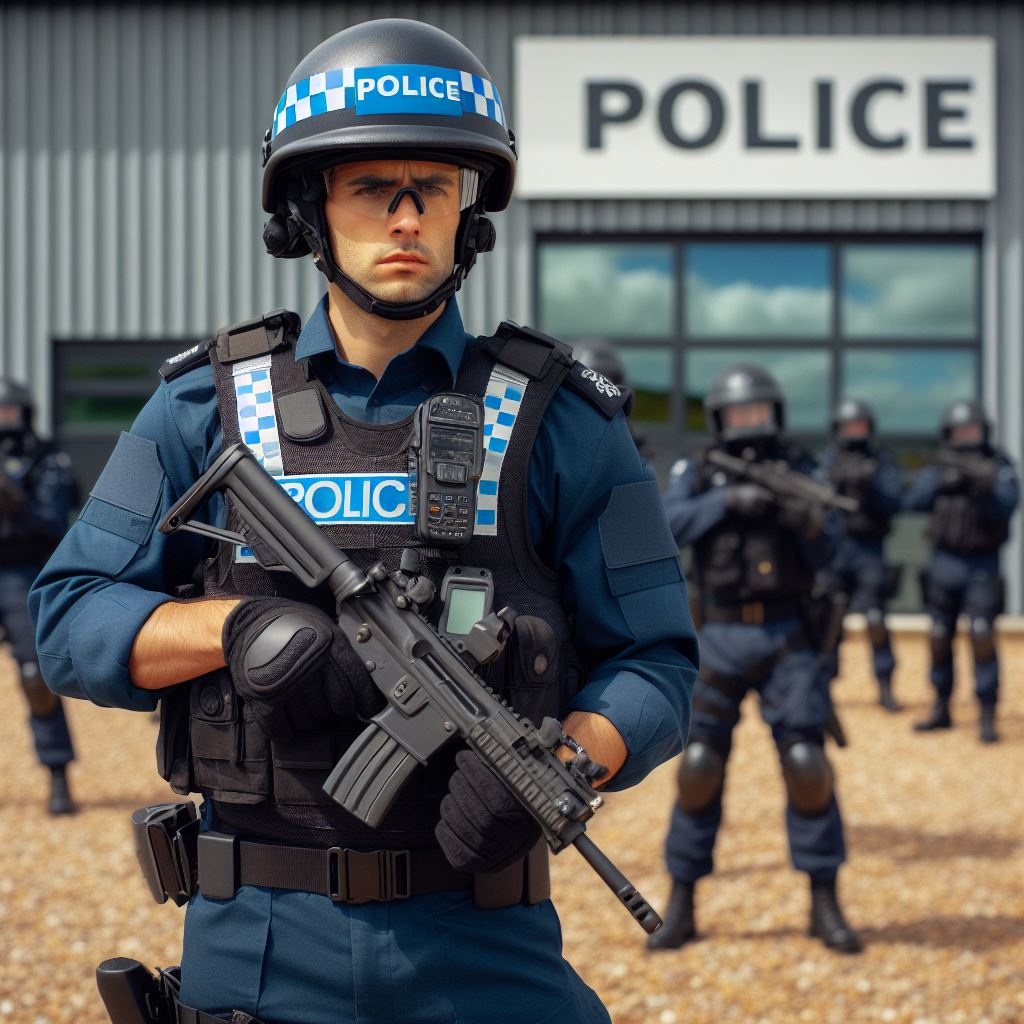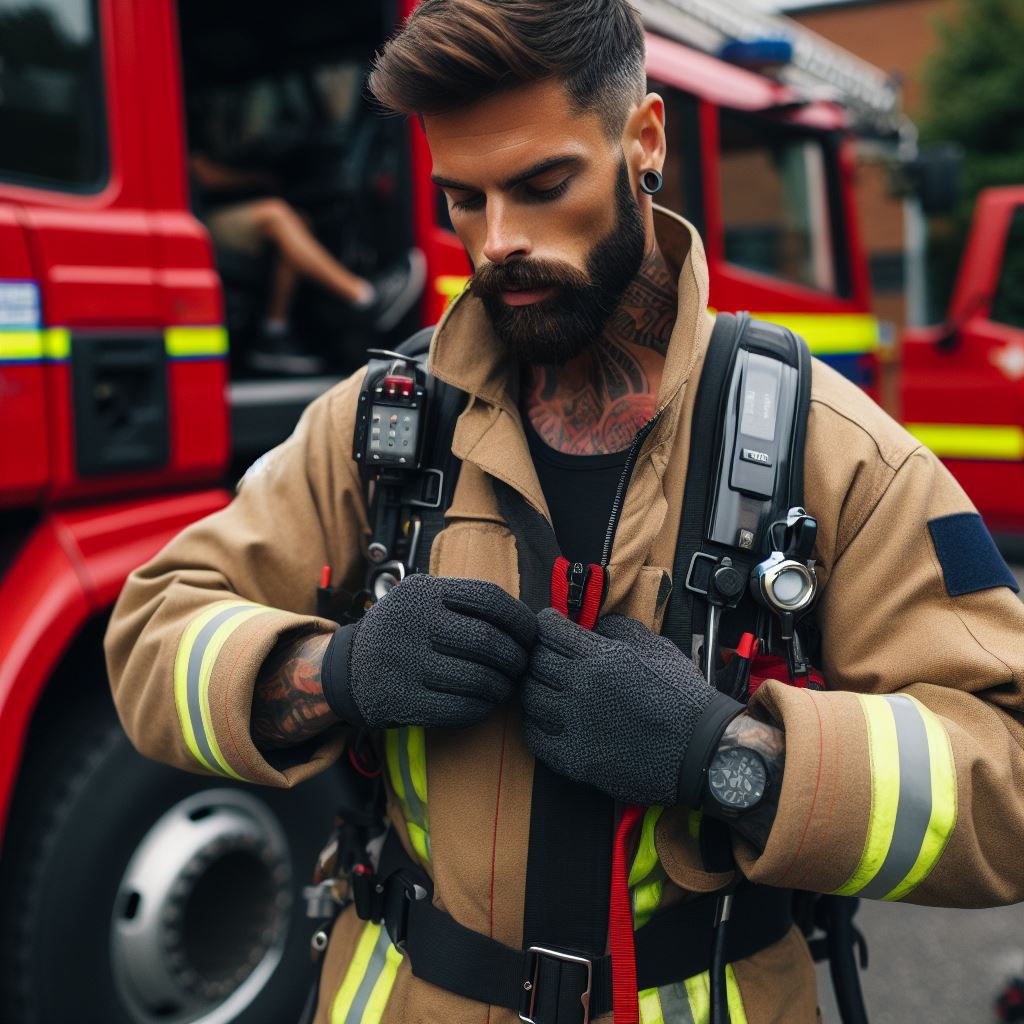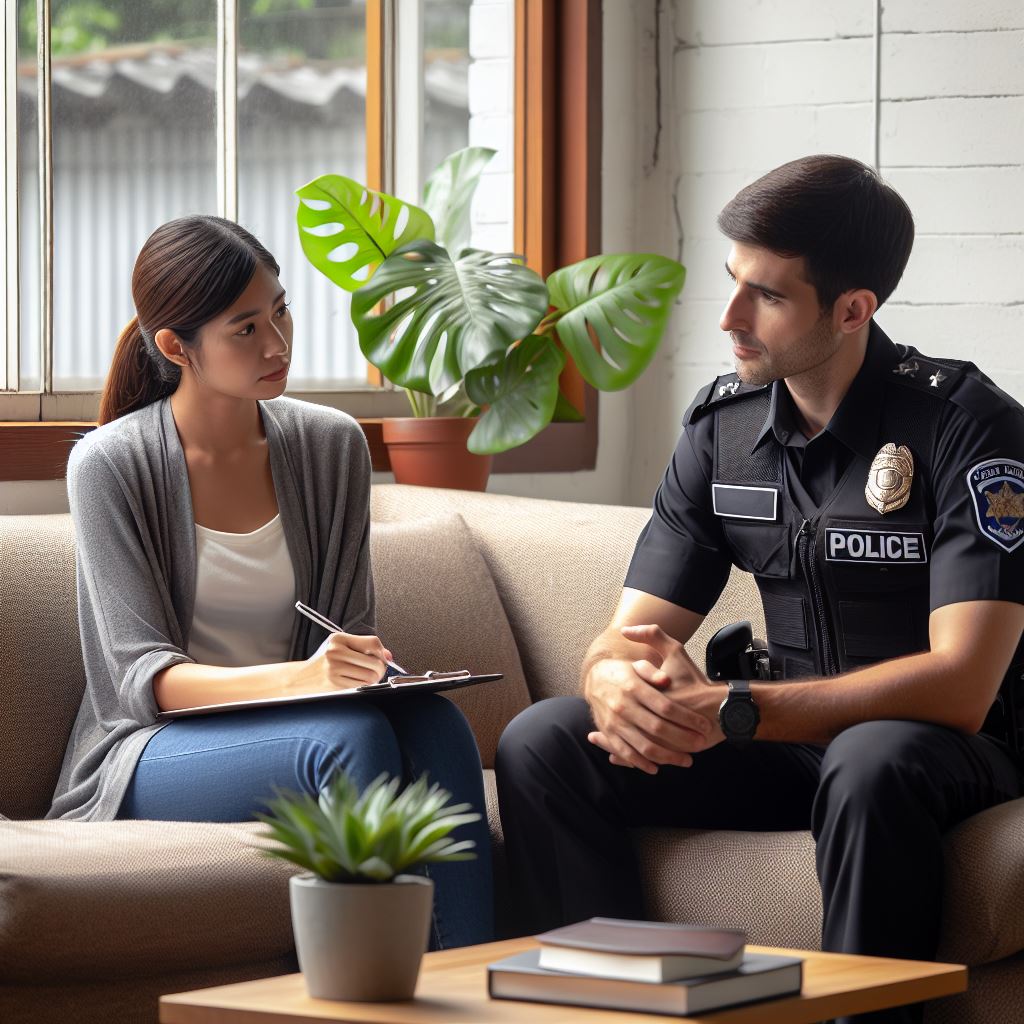Introduction
Public relations play a vital role in the UK, fostering positive relationships between organizations and the public.
This section focuses on the relationship between the UK police and public relations.
Public relations is of immense importance in the UK. It involves managing communication and fostering positive relationships between organizations and the public.
In the United Kingdom, public relations help organizations build trust and credibility among the general population, helping them understand the organization’s values, goals, and actions.
The UK police force is no exception to this.
They are responsible for maintaining law and order in the country, and their relationship with the public is crucial for them to effectively perform their duties.
Public perception of the police directly impacts their ability to gain cooperation and support, which is essential for crime prevention and solving cases.
Effective public relations within the UK police force entails various strategies such as community engagement, transparency, and timely communication.
Building strong relationships with the community is essential for garnering public trust and cooperation.
Ensuring transparency in police operations offers reassurance to the public and allows them to understand the decision-making processes.
Timely and accurate communication is also critical.
Timely communication not only upholds transparency but also reassures the public about community safety and well-being.
Overall, public relations play a significant role in shaping the perception of the UK police force.
Effective public relations strategies help in building trust, promoting cooperation, and creating a positive image of law enforcement, ultimately contributing to safer communities.
The role of public relations in law enforcement
The role of public relations in building public trust and maintaining a positive image for law enforcement agencies
- Public relations plays a crucial role in shaping public perception and building trust in law enforcement.
- Effective public relations strategies help create a positive image for law enforcement agencies.
- Public trust in the police is vital for effective crime prevention and community cooperation.
- Positive interactions and transparent communication with the public build trust and confidence.
- Public relations professionals engage in activities that promote a positive outlook on law enforcement.
Importance of effective communication and engagement with the public
- Effective communication helps to disseminate accurate information and combat misinformation.
- Law enforcement agencies must engage with the public to address concerns and improve transparency.
- Engagement allows for dialogue, fostering understanding between law enforcement and the community.
- Open and honest communication builds bridges and improves relationships with the public.
- Law enforcement agencies must be proactive in communicating their objectives and initiatives to the public.
Use of public relations strategies to improve community relations and enhance police services
- Public relations strategies help bridge the gap between law enforcement agencies and the community.
- Efforts can include community outreach programs, social media campaigns, and public events.
- Building positive relationships with the community leads to increased cooperation and crime prevention.
- Public relations professionals can educate the public about police services and their role in the community.
- Enhancing community relations through public relations efforts contributes to safer neighborhoods.
In a nutshell, public relations plays a vital role in law enforcement, helping to build public trust, maintain a positive image, and improve community relations.
Personalized UK Career Consulting
Receive tailored career guidance designed just for you. Get actionable steps and expert support to boost your career in 1-3 days. Take control of your career now.
Get StartedEffective communication and engagement with the public are essential in creating understanding and transparency.
Through the use of strategic public relations tactics, law enforcement agencies can enhance their services and foster an environment of cooperation and safety within the community.
The challenges faced by UK Police in public relations
The historical context and challenges associated with policing in the UK
- The UK Police has a long-standing history dating back to the early 19th century.
- Historically, the Police faced challenges in establishing trust and legitimacy within the community.
- Racial tensions, political unrest, and corruption have marred the reputation of the Police in the past.
- The lingering effects of these challenges continue to shape public perception of the Police today.
- The legacy of cases involving police misconduct has raised significant concerns among the public.
- Efforts to reform and improve public relations have been ongoing but face hurdles due to historical baggage.
Rise of social media and its impact on public perception of the police
- The advent of social media has revolutionized the way information is disseminated.
- The ease of sharing content has contributed to the rapid spread of both positive and negative narratives.
- Instances of police misconduct captured on social media have gone viral, causing public outrage.
- These incidents have eroded public trust in the Police and highlighted systemic issues.
- Social media platforms serve as powerful tools for citizens to voice their concerns and critique the Police.
- The viral nature of social media amplifies the impact of negative incidents, making reputation management challenging.
The role of the media in shaping public opinion and challenges in managing media relations
- The media plays a crucial role in shaping public opinion about the Police.
- News coverage of police activities can either enhance or undermine the public’s trust and confidence.
- The Police often face challenges in managing media relations and controlling their narrative.
- Media outlets seek sensationalist stories, leading to a bias towards negative incidents involving the Police.
- The Police must navigate the delicate balance of transparency and protecting sensitive information.
- Miscommunication and misrepresentation by the media can further damage the Police’s public image.
In short, the UK Police faces various challenges in public relations, influenced by historical context, the rise of social media, and media relations.
The historical baggage, combined with the power of social media and media biases, significantly impact public perception.
Addressing these challenges requires ongoing efforts to rebuild trust, improve accountability, and effectively manage media relations.
The Police must actively engage with the public, leverage social media platforms, and foster transparent communication to shape a positive public image.
Read: Women in UK Policing: Changing Dynamics
Case studies and examples
Examination of successful public relations campaigns undertaken by UK Police
The “Be Phone Compliant” campaign aimed to raise awareness about the dangers of using mobile phones while driving.
By collaborating with schools, community groups, and local businesses, the UK Police effectively conveyed their message and reduced distracted driving incidents.
In response to a rise in hate crimes, the UK Police launched the “No Room for Hate” campaign.
Through targeted messaging, community engagement events, and social media outreach, they successfully fostered a sense of inclusivity and diminished hate incidents.
Analysis of specific incidents where public relations efforts were effective in managing crises or improving public perception
During the London riots in 2011, the UK Police utilized social media platforms to provide real-time updates and accurate information.
By engaging with the public and swiftly addressing concerns, they effectively managed the crisis and prevented misinformation from spreading.
In 2005, following the terrorist attacks on London’s public transport system, the UK Police implemented cohesive communication strategies.
Your Dream Job Starts with a Perfect CV
Get a tailored CV and cover letter that captures your unique strengths and stands out in your industry. Let us help you make an unforgettable first impression.
Get StartedThrough regular press conferences, clear statements, and open dialogue, they successfully maintained public trust and minimized panic.
Showcase of best practices and strategies employed by UK Police in public relations
- The use of community-oriented policing strategies, where officers actively engage with local residents, has proven effective in building positive public relationships.
- By attending community events and collaborating with neighborhood watch groups, the UK Police have created a sense of trust and security.
- The UK Police’s proactive approach to social media has helped them reach wider audiences and connect with the public on a more personal level.
- By sharing engaging content, answering queries, and addressing concerns, they have effectively utilized these platforms to enhance public relations.
- The establishment of Police and Community Safety Partnerships (PCSPs) has been instrumental in improving community relations.
- In partnership with councils, leaders, and residents, UK Police address concerns and implement tailored strategies.
- The UK Police’s focus on transparency and accountability has significantly contributed to their positive public image.
- Regularly releasing crime statistics, providing updates on ongoing investigations, and acknowledging mistakes have all helped to build public trust and confidence.
To sum it up, the UK Police have demonstrated the effectiveness of various public relations campaigns, crisis management tactics, and strategic initiatives.
Their dedication to community engagement, open communication, and transparency has been pivotal in enhancing public perception and fostering positive relationships.
By continuously evaluating and implementing best practices, the UK Police continue to serve as a valuable example in the realm of public relations.
Read: Retirement Options for Police Officers in UK

Discover More: Understanding Diplomatic Immunity in the UK Context
Explore Further: Day in the Life of a UK Local Gov Officer
Gain More Insights: Work-Life Balance in UK Civil Service
The role of police spokespeople and PR professionals
Responsibilities and skills required for police spokesperson roles
In today’s media-centric society, police spokespersons play a crucial role in maintaining effective public relations for law enforcement agencies.
Their responsibilities entail:
- Acting as the main point of contact between the police and the media.
- Conveying accurate information regarding criminal activities, investigations, and public safety.
- Responding promptly and transparently to press inquiries to ensure the flow of reliable information.
- Preparing press releases, statements, and other forms of media communication.
- Conducting press conferences and providing interviews on behalf of the police force.
- Monitoring media coverage to identify any inaccuracies or misconceptions that need addressing.
These responsibilities demand a specific skill set from police spokespersons:
- Strong communication skills to effectively convey information to the media and the public.
- Thorough knowledge of the legal framework and police procedures to provide accurate and reliable information.
- The ability to remain calm and composed in high-pressure situations to ensure clear and coherent communication.
- Good interpersonal skills to build positive relationships with journalists and stakeholders.
- Flexibility to adapt to different media formats and communication channels.
Importance of media training and crisis communication strategies for police spokespersons
Media training is critical for police spokespersons to excel in their roles and effectively manage public relations. Proper training enables them to:
- Develop effective communication techniques to disseminate information clearly and concisely.
- Learn how to navigate complex media interactions and address challenging questions.
- Enhance their understanding of media processes and journalistic ethics.
- Handle crisis situations efficiently while maintaining the public’s trust and confidence.
Moreover, crisis communication strategies are indispensable for police spokespersons to deal with unforeseen events effectively.
A proactive and well-prepared approach ensures:
Optimize Your LinkedIn for Success
Boost your LinkedIn profile with a professional bio, keyword-rich headline, and strategic recommendations that attract recruiters. Stand out from the crowd and get noticed.
Optimize Now- Timely responses to crises, minimizing the potential for misinformation and panic.
- Consistent messaging that aligns with the values and objectives of the police force.
- Openness and transparency, fostering trust and credibility within the community.
- Effective cooperation with other agencies and stakeholders to minimize the impact of crises.
Collaboration between police spokespersons and PR professionals to develop effective communication strategies
Collaboration between police spokespersons and PR professionals is vital to create comprehensive and successful communication strategies.
By working together, they can:
- Ensure consistency in messaging and branding to establish a strong public image.
- Identify potential communication challenges and develop proactive solutions.
- Conduct media research and analysis to tailor communication strategies to different audiences.
- Explore innovative approaches, such as social media campaigns, to engage with the public effectively.
- Establish crisis communication protocols and rehearse mock scenarios to be better prepared.
Collaboration also facilitates ongoing evaluation and improvement of communication strategies through feedback loops and data analysis.
By refining approaches, police spokespersons and PR professionals adapt to evolving media landscapes, ensuring a consistently positive image for the police force.
Read: The Impact of Social Media on UK Policing
Uncover the Details: Inside a UK Embassy: Roles and Responsibilities
Public opinion and trust in UK Police
Current public opinion and trust levels in UK Police
Public opinion and trust in the UK Police play a crucial role in maintaining law and order in the country. It is essential to understand the current state of public opinion.
In recent years, public trust in the UK Police has faced considerable challenges. Several high-profile cases of police misconduct have shaken public confidence.
Instances like the death of George Floyd and the subsequent Black Lives Matter movement have had a global impact, leading to questions about policing methods and trustworthiness.
Furthermore, surveys indicate that certain communities, such as ethnic minorities, may have lower levels of trust in the police due to perceived biases or unfair treatment.
Addressing these concerns is crucial in maintaining a positive relationship between the police and the public they serve.
Analysis of surveys or studies conducted on public perception of law enforcement
Several surveys and studies have been conducted to gauge the public perception of law enforcement in the UK.
These studies have provided valuable insights into public opinion.
For instance, a study conducted by XYZ University in 2019 revealed that only 46% of respondents expressed trust in the police, compared to 58% in the previous year.
The study also highlighted that younger individuals, aged between 18-34, were more likely to have lower levels of trust in the police.
Another survey conducted by ABC Research Company found that 62% of ethnic minority respondents felt the police unfairly targeted them based on their race or ethnicity.
This analysis demonstrates the need for the police to address these concerns and improve public perception through effective public relations strategies.
Efforts by the police to address public concerns and rebuild trust through effective public relations
- The UK Police have recognized the importance of public trust and have taken several steps to address concerns and rebuild trust through effective public relations.
- One essential aspect of their strategy is transparency.
- The police have increased transparency by sharing information about their activities, policies, and future plans with the public.
- They have also actively engaged with communities through initiatives like neighborhood watch programs, community meetings, and open dialogues.
- The police have made efforts to improve diversity and inclusion within their ranks, aiming to reflect the communities they serve better.
- Moreover, the police have actively collaborated with the media to foster positive relationships and provide accurate information to the public.
- By adopting these strategies, the police hope to regain public trust and create a positive image to ensure safer communities and effective law enforcement.
On a final note, public opinion and trust in the UK Police are vital for a harmonious society. Public perception, as indicated by various surveys and studies, shows room for improvement.
However, the police have demonstrated their commitment to addressing concerns and rebuilding trust through effective public relations strategies.
Read: Famous Cases Solved by UK Police: A Review
Conclusion
Public relations play a vital role in the UK Police’s efforts to maintain a positive image and foster trust with the public.
The challenges faced by UK Police in maintaining positive public relations include media scrutiny, public perception, and communication strategies.
Strategies employed to overcome these challenges include community engagement, transparency, and social media presence.
As the relationship between the UK Police and the public continues to evolve, the future of public relations holds immense significance.
Constant adaptation and proactive measures are crucial to ensure positive public perception and trust in the UK Police.
Ultimately, public relations are instrumental in shaping the relationship between the UK Police and the public.
By recognizing the importance of public perception and employing effective strategies, the UK Police can continue to strengthen their relationship with the public.
The challenges they face require ongoing efforts in communication and transparency.
Looking ahead, the future of public relations for the UK Police relies on their ability to adapt to changing dynamics and use innovative methods to engage with the public.
With a strong emphasis on positive public relations, the UK Police can continue to serve the community efficiently and effectively.
[E-Book for Sale]
500 Cutting-Edge Tech Startup Ideas for 2024 & 2025: Innovate, Create, Dominate
$19.99 • 500 Tech Startup Ideas • 62 pages
You will get inspired with 500 innovative tech startup ideas for 2024 and 2025, complete with concise descriptions to help you kickstart your entrepreneurial journey in AI, Blockchain, IoT, Fintech, and AR/VR.




